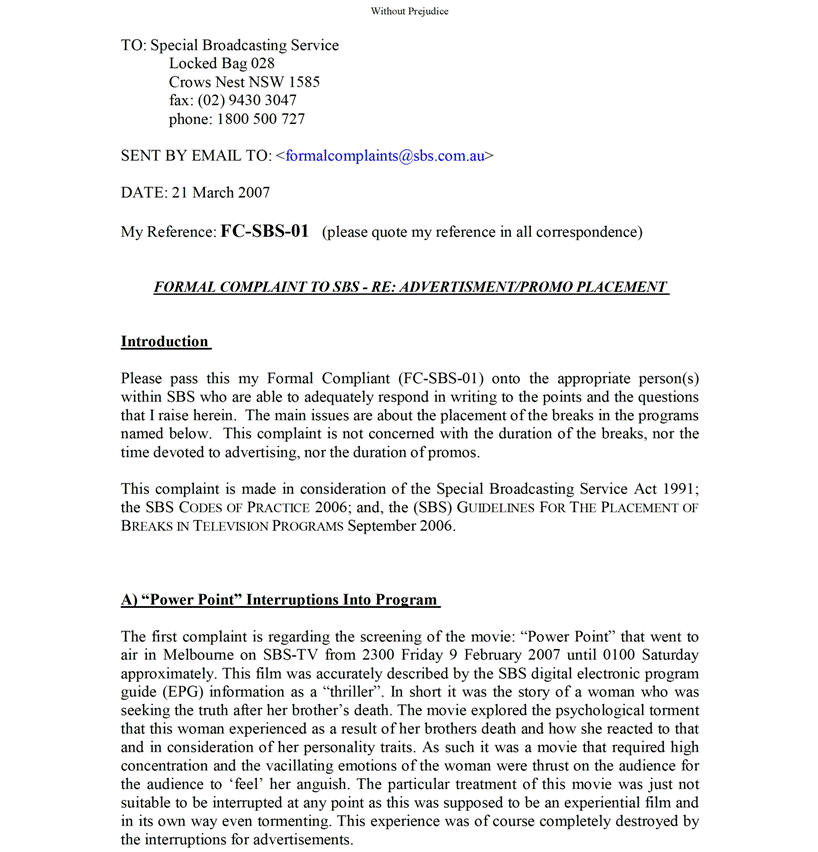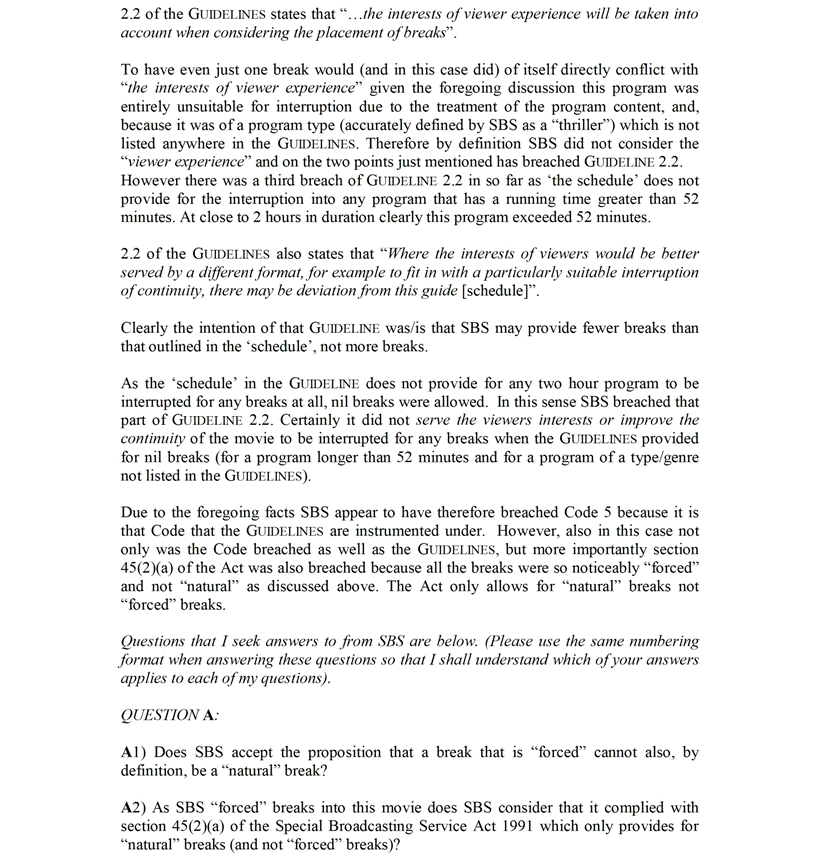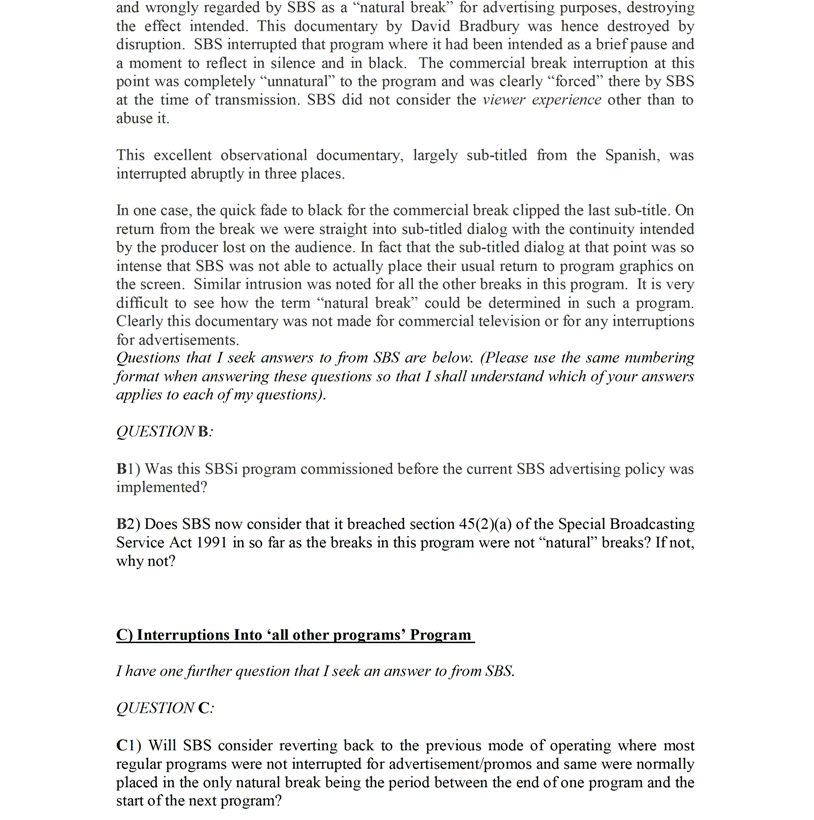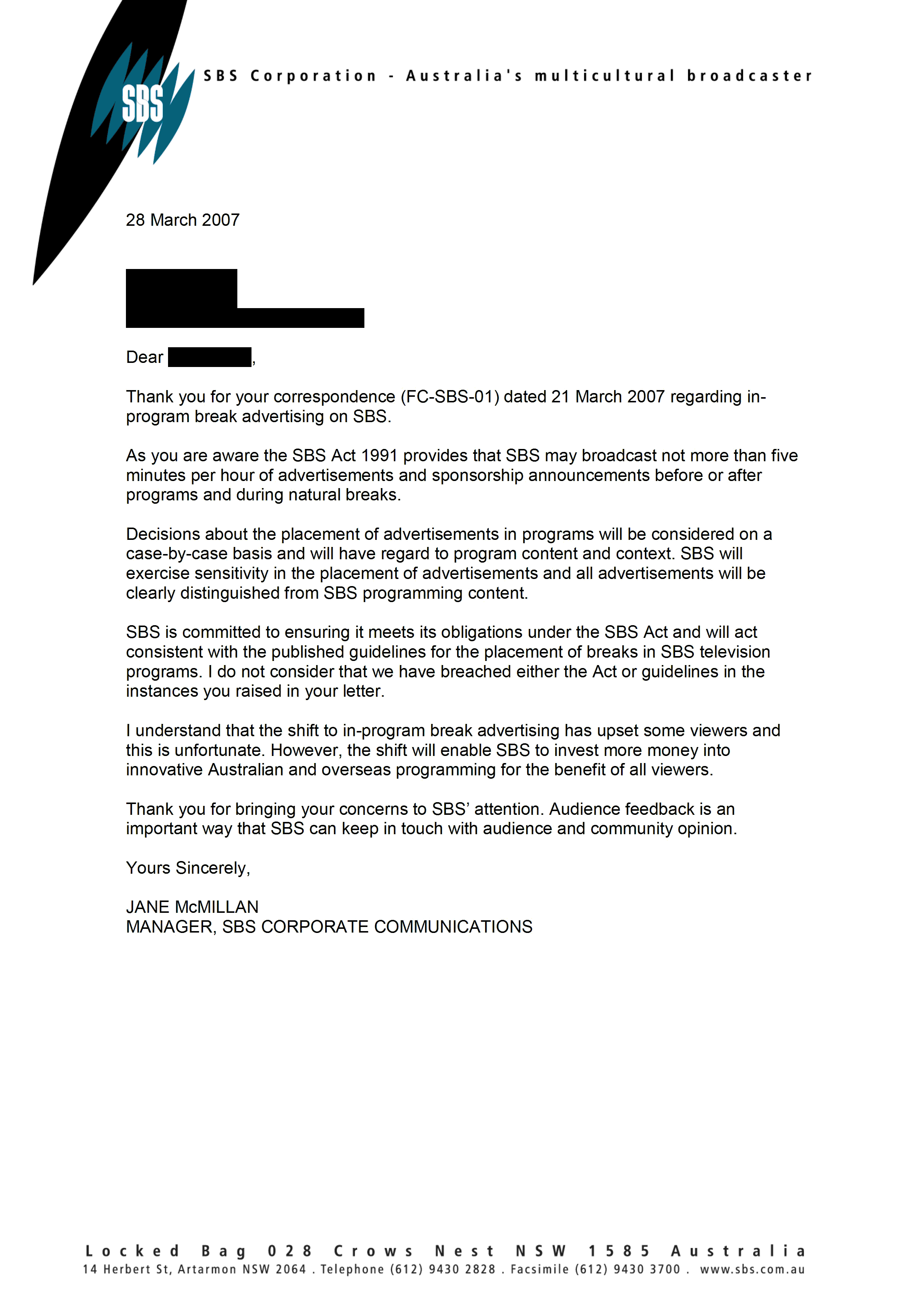|
Sign the petition to protect SBS, stop the ads and maintain our multicultural public broadcaster funded fully by government. Click http://petition.saveoursbs.org and wait while you are redirected to the petition server. |
SaveOurSBS
SBS Avoids Complaint About Ad Interruptions
SBS have devised a new protocol in broadcasting. If you have a complaint about SBS breaching its own advertising guidelines, there is no system to have your complaint properly dealt with either by SBS or the regulator. Complaints about ads, are not covered by the SBS Codes of Practice.
Prior to SBS making the decision in 2006 to interrupt SBS-TV for commercial breaks, in a very clever move, SBS changed the SBS Codes of Practice (PDF) and introduced a new document called the (SBS) Guidelines For The Placement of Breaks in Television Programs September 2006 (PDF) which essentially provides the SBS definition of “natural program breaks”. The move was clever and premeditated because the Board of SBS knew that they were establishing a system whereby SBS would have no accountability to the general public nor anyone who wished to lodge a formal complaint about the broadcasters decision to interrupt SBS-TV programs for advertisements. The Special Broadcasting Service Act 1991 (PDF) does not define “natural program breaks.”
All broadcasters are required to have a Codes of Practice. The Codes are reviewed every three years or so. The Codes are required under legislation and registered with the regulator, The Australian Communications & Media Authority (ACMA).
Under broadcasting legislation the intent of the Codes was among other things, to establish program and advertising standards and to provide a complaints system for a person who wishes to complain about any material broadcast. However in their Codes of September 2006, SBS wanted to avoid dealing with their decision to interrupt TV programs for ads. To do this SBS decided that the placement of ads, would not be covered under the Codes of Practice to the extent that: Code 5.2 states that “The SBS Board will develop guidelines on matters relating to the placement . . . of advertisements. . .” which the Board has done, the (SBS) Guidelines For The Placement of Breaks in Television Programs September 2006. These Guidelines therefore are the SBS definition of “natural program breaks”.
The problem for the viewer is that should you believe that SBS has breached its own definition of where ads should be placed, you have no recall. The Guidelines are now separate from the Codes. If the definition of “natural program breaks” were defined in the Codes, you would have some redress and SBS would be required to deal with your complaint. If you were not satisfied with their response, you could take your advertising complaint to the regulator ACMA.
ACMA can only follow up on complaints that are a breach of the Codes. As the Guidelines For The Placement of Breaks in Television Programs are separated from the Codes of Practice there is no legislative mechanism for ACMA to even consider any complaints about SBS interrupting any program for ad breaks.
If you believe that SBS should not be interrupting TV programs for advertisements there is no legislative process to deal with your complaint. Similarly if you just thought that they were insensitive about where they placed the ads in a certain program bad luck.
For this reason alone you should sign the petition to stop ads on SBS.
SBS Brushes Off Complaint (below)
Save Our SBS (SOSBS) has been given a complaint (below) from an SBS viewer together with a response from SBS that highlights that there is no proper framework to deal with a complaint from a viewer about ads in program.
In this case the allegation was that SBS had breached its own Guidelines For The Placement of Breaks in Television Programs September 2006 and therefore breached the SBS Codes of Practice 2006; and, the Special Broadcasting Service Act 1991. SBS brushed aside the complaint.
The complainant told SOSBS that originally allegations about ads in three programs were to be complained of but at the last minute, the complainant only complained of ads in two programs however left a numbering reference to the third program. We mention this should you wonder ‘what is the third program?’ It was never named in the complaint to SBS about advertisements interruptions into program.
The arguments of the complainant below are a little technical but well worth reading along with the response from SBS following:-
*******************************






*******************************
Sign the petition to protect SBS and stop ads in programs.
SBS Response To The Complaint Above
The reply from SBS does not address the specific questions raised by the complainant (above) other than to say that SBS believes they have done nothing wrong. This is under the pretext that the Guidelines are now separate from the Codes and there is no legal requirement on the part of SBS to deal with any complaint that is outside the Codes.
It is worth reading the response from SBS below:-
*******************************

*******************************
What Does The Above Mean?
The above clearly shows that Special Broadcasting Service Act 1991 is inadequate as it does not define “natural program breaks” nor does it give any rights to a viewer who believes that SBS has “forced” advertisements into an “unnatural” break. The above complaint and reply from SBS also shows that the SBS Codes of Practice 2006; and, the (SBS) Guidelines For The Placement of Breaks in Television Programs September 2006 are totally inappropriate for SBS or indeed any public broadcaster. All three instruments need reform.
Sign the petition to protect SBS and to save our multicultural broadcaster.
|
Sign the petition to protect SBS, stop the ads and maintain our multicultural public broadcaster funded fully by government. Click http://petition.saveoursbs.org and wait while you are redirected to the petition server. |
SaveOurSBS
